The current flag bearer for black track cycling hails from South Africa – and there’s irony in that, given the vile apartheid regime which ruled the country for so long. But there are no chips on the shoulders of Nolan Hoffman, he’s too busy training and racing to dwell on past injustices.
Despite the UCI’s rush to Mondialise, there are precious few faces other than white ones in the peloton. Back in the 70’s and 80’s, Britain’s Maurice Burton defied the overt racism in much of Europe to make a name for himself on the Six Day circuit.
And in the 80’s, New York’s Nelson Vails won Olympic and Worlds medals to fly the flag for ‘Black Power’ – whilst Frenchman Yave Cahard was one of the best pro sprinters in the world.
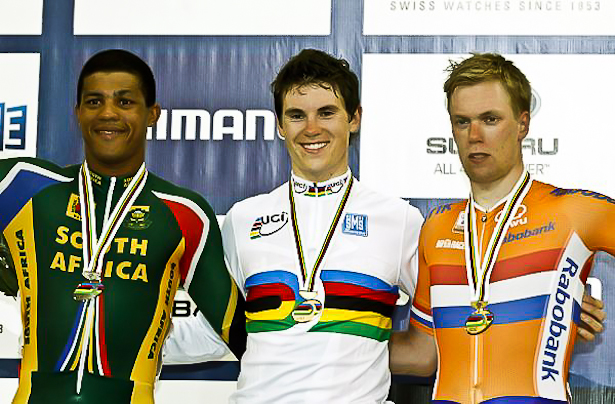
Least you think that Hoffman is racing at a low level, check out the results of the World Scratch Championship for 2012.
Right behind Ben Swift’s gold, you’ll find Hoffman’s name as silver medallist.
He took time to talk to VeloVeritas after his afternoon training on the Grenoble velodrome.
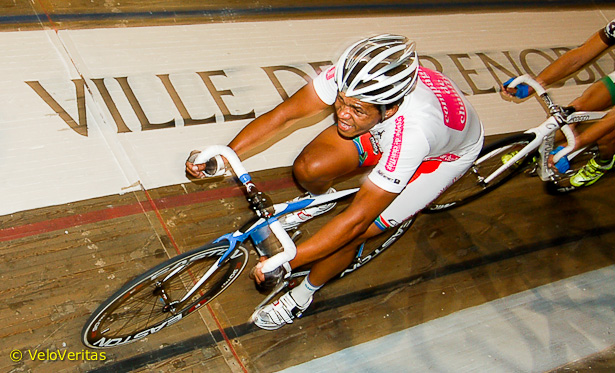
How did you get into cycling, Nolan?
“It’s a rugby and soccer culture in South Africa; I played rugby at school.
“But the town where I lived was a popular pit stop for cyclists. Then interested me; ‘where have these guys on bikes come from, where are they going…”
What’s the cycling scene like in South Africa?
“We have a big pool of talent but the system is based more on recreational then competitive cycling. Despite that, we still produce good riders – look at Robbie Hunter and Daryl Impey.
“Sportiv events attract huge numbers, but it’s always the same guys at the criteriums.
“The MTN Qhubeka team is doing a great deal for African cycling, not just South African but Ethiopean and Eritrean too.”
With MTN going pro continental for 2013 did you think about approaching them?
“I ride for Tasol Solar Energy, it’s a fairly small team but I chose that because it gives me the freedom to ride the track as I want.
“Doug Ryder the main man with MTN wants to develop guys on the road – and I think that for me at 27 that’s too late.
“I want to continue to compete at the highest level on the track.
“When I was younger I tried that but my aspirations now are on the track.”
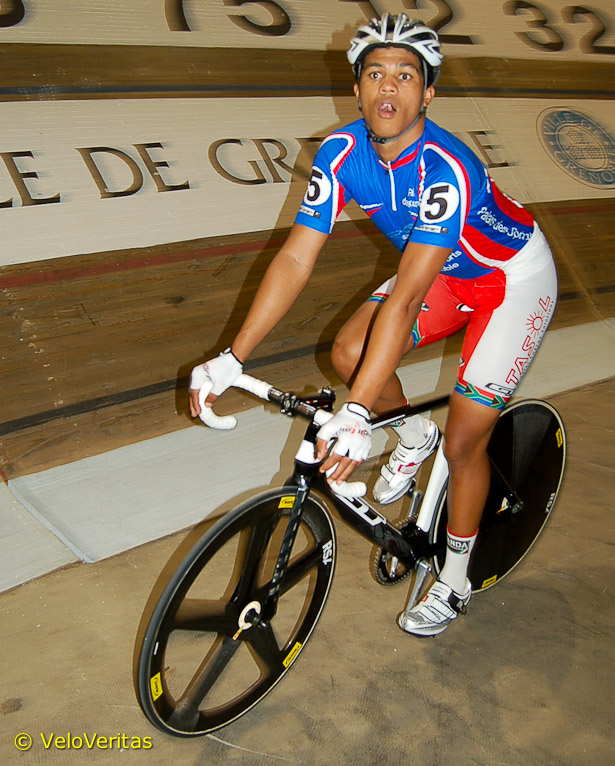
Tell us about your training.
“Riding the Six Days has been a big wake up call.
“I do a lot of road racing in South Africa but the races are shorter and I’m finding that I don’t have the core to contend with the demands of the Sixes – as the days go by, I find it harder.”
You’ve ridden the road at a pretty high level – Langkawi and Turkey.
“Yes, I had that opportunity with Barloworld, but I went to those races without having done the training you need for them.
“But despite that I was competitive in the sprint finishes – I got quite a few top ten placings.”
Did you ever consider a full Euro road programme?
“When I was younger it was something I considered; but there was money in the South African races.
“There are a lot of challenges in embarking on a European programme – not least is getting a visa.
“And the dream fades as you continue to make money, buy a house and can’t afford to dream.”
Do you have a Euro base for the winter?
“I’m based in the Netherlands for two months, staying with Peter Schep – he has friends in South Africa and that’s how the connection was made.”
How many Sixes have you ridden?
“I rode Zurich in 2009, I’ve ridden the summer Six Day at Fiorenzuola twice, Amsterdam and now here.
“I have a contract for Gent and will get one for Rotterdam if I do well in Gent.
“The weather is the biggest challenge for me, but staying with Peter he gives me guidance and we train on the indoor tracks and rollers.
“I hope to ride the World Cup in Glasgow – but if you’re South African then a visa is always a problem.”
Road or track, which is your first love?
“Track; the road pays my salary, it’s less hard to make money there than it is in Europe – but track is my first love.”
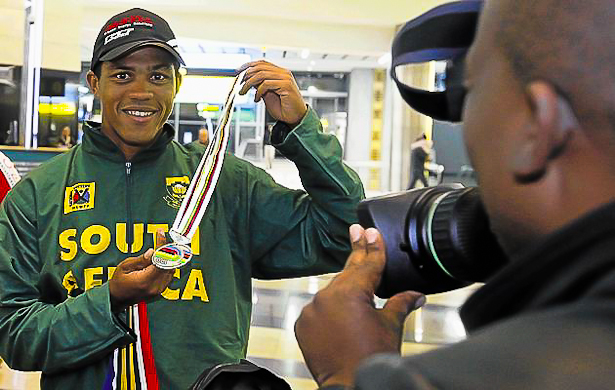
Tell us about your Worlds scratch silver.
“It took a lot of training effort and a lot of help from my team. I was really only at the team’s service for three months; the rest of the time I was on the track or at training camps.
“I put in a good base of road and World Cups to prepare for the Worlds. I spoke to the Federation and we discussed whether I should target the omnium or scratch at the Worlds.
“The scratch seemed a better bet – quick, all the eggs in one basket.
“I was top ten in the scratch in Astana and Beijing, so I knew I could be competitive at the Worlds. I knew all the guys who were riding the Worlds and figured a top five was possible.
“I have no nightmares about coming second – what a pleasure it was to walk away with that silver medal.”
[vsw id=”XwunlqvNoR8″ source=”youtube” width=”615″ height=”450″ autoplay=”no”]
How was the Amsterdam Six Day?
“Oooohhhh! A definite shock to the system!
“It’s such a small track but the chases are incredible and the supporting sprints and eliminations and the rest are very fast. In the chases I was hanging on for dear life – I was fortunate to ride with Marc Hester; it’s good to be with a rider who knows the Sixes and who always puts you in the right place.”
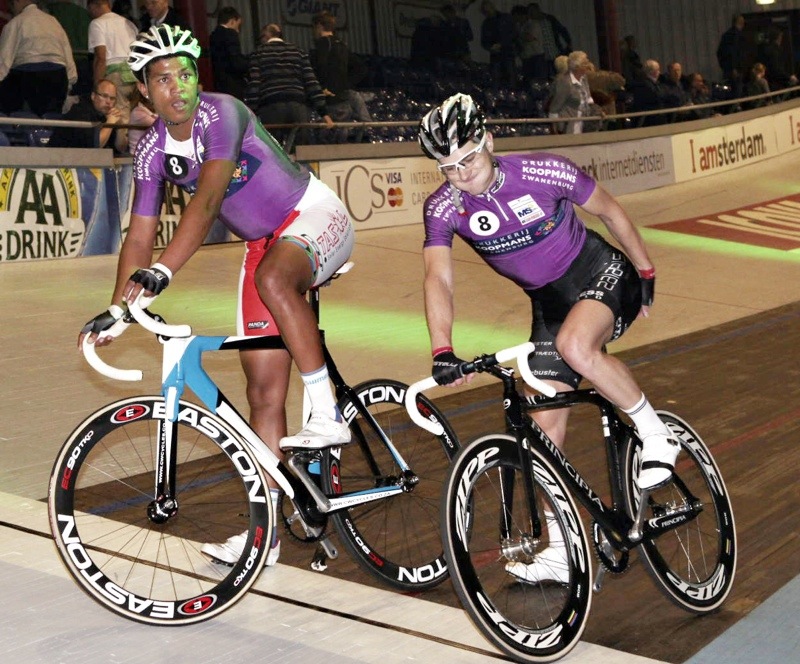
What about here in Grenoble?
“It’s hard here too; in Amsterdam there was a bigger pool of fast guys but here there are less high level guys so you have to work hard at making the race.”
Is racism something you ever encounter?
“Fortunately not; there’s been nothing ‘in your face.’ Back home we don’t have a good history, with apartheid and all, but it’s never been an issue in cycling.
“I joke about the fact that I’m black. In Amsterdam they made me feel very welcome – I just want to ride my bike and be part of the Six Day system.
“It’s not something that I set out to do, but I’ve become a role model for black cyclists – and I’ve embraced that role. I’ve been helping a rider called Clint Hendrix.
“We’ve arranged for him to rise with VC La Pomme in Marseille – I’m trying to make it better for the young black guys.”



